What causes hepatitis B? Can it be cured? Stages of the disease.
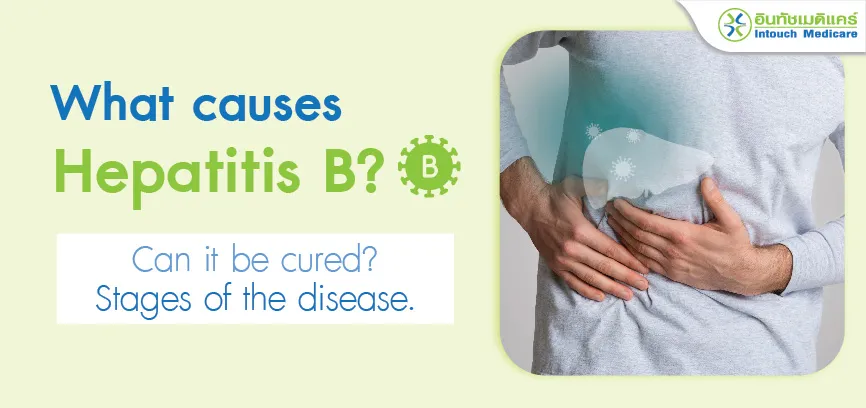
Hepatitis B A dangerous disease that many overlook and are complacent about preventing. This condition is often asymptomatic, making it hard to detect early. Once infected, it is difficult to cure, and in some cases, it can progress to chronic conditions like cirrhosis or liver cancer.
Learn more about hepatitis B—what the virus is, how it is transmitted, who is at risk, how it is diagnosed and treated, and the steps you can take to prevent infection.
Interesting Facts about Hepatitis B Virus
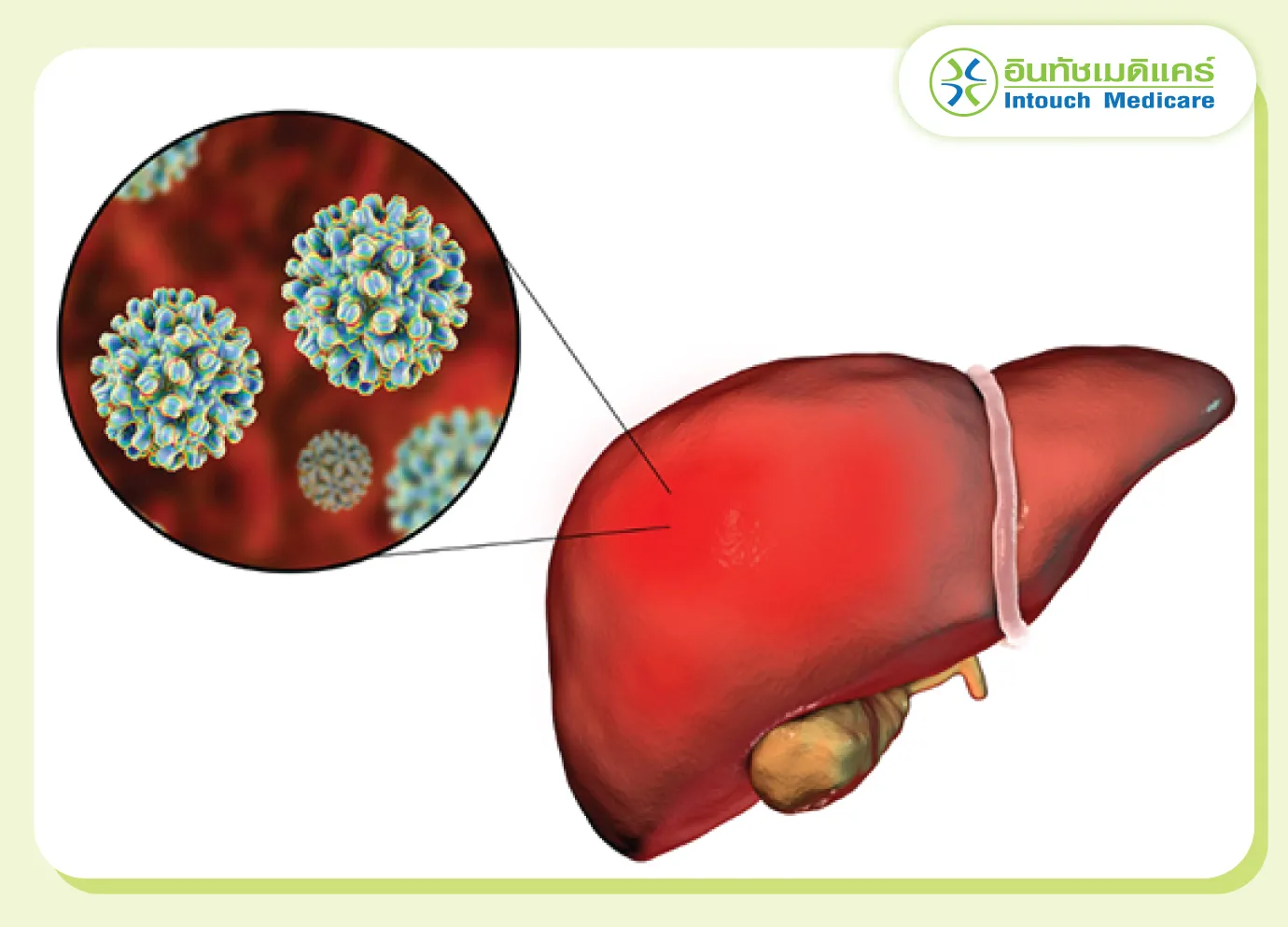
What is Hepatitis B?
Hepatitis B is a serious disease that affects the liver, caused by the hepatitis B virus. It primarily transmits through blood and bodily fluids (blood-borne). When infected, individuals may experience mild illness for a few weeks, or it can lead to life-threatening chronic illness that persists for a lifetime.
What causes Hepatitis B?
The cause of this disease is the introduction of the hepatitis B virus into the body through blood, lymphatic fluid, and secretions.
![]()
How is it transmitted?
The hepatitis B virus is transmitted through the blood and bodily fluids of infected individuals. This can occur in several ways, including:
Transmission from an infected mother to her child during pregnancy.
Receiving blood from an infected donor.
Sexual contact without protection, increasing the risk of transmission.
Sharing personal items that may be contaminated with the virus.
Contact with the blood or bodily fluids of an infected person.
Stages of the disease
The symptoms of hepatitis B virus infection in children are often asymptomatic (subclinical infection), which may lead to a chronic stage. In adults, the infection typically begins with acute symptoms.
Acute Phase (Acute Hepatitis B)
This phase leads to short-term illness that occurs within the first six months after infection. It can be divided into three stages:

Prodromal Phase
This is the incubation period of the disease, during which patients may experience the following symptoms for 2-14 days:
Dizziness
Some individuals may have mild fever
Feelings of fatigue
Nausea and vomiting
Joint pain
Frequent pain in the right upper quadrant (the area of the liver)
Rash resembling hives

Icteric Phase
This phase follows the prodromal phase, during which the body exhibits signs of liver inflammation. Patients may experience symptoms such as yellowing of the skin and eyes, known as jaundice, due to elevated levels of bilirubin in the blood. Symptoms include:
Dark urine
Pale stools
Loss of appetite and weight loss
Other symptoms may also be present
If you notice these symptoms, it is advisable to consult a doctor to prevent complications.
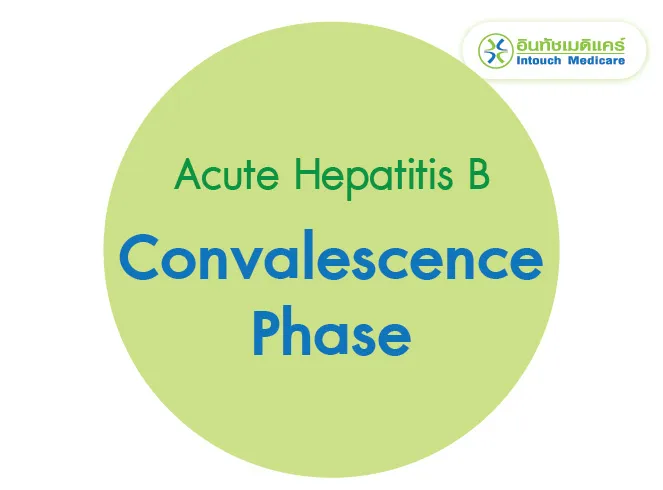
Convalescence Phase
This phase lasts for several weeks following the icteric phase, during which the symptoms of the hepatitis B virus begin to decrease. It marks the period when the body starts to function normally again, with the following signs:
The color of stool and urine returns to normal.
Jaundice symptoms begin to resolve.
Other symptoms from the icteric phase gradually subside.
Chronic Hepatitis B
This phase involves long-term illness caused by the Hepatitis B virus remaining in the body. Those who contract the virus and enter the chronic phase often remain asymptomatic for an extended period. Symptoms may arise in cases of complications. The chronic phase can be further divided into four stages:
Stage 1: Immune Tolerant Phase
Most patients typically acquire the infection from mother to child and remain infected for a long time.

The body shows no abnormal symptoms.
The virus is detected at high levels in the blood and liver.
There are no signs of liver fibrosis or hepatitis because the immune system has not yet been activated to attack the virus.
Stage 2: Immune Clearance Phase (Immune Active Phase)
The patient's body begins to stimulate the immune system to eliminate the virus, resulting in hepatitis.
The virus remains at high levels in the blood.
Symptoms may or may not be present; abnormalities must be detected through blood tests.
Patients in this stage with prolonged hepatitis may develop liver fibrosis and progress to cirrhosis.
Stage 3: Inactive Phase (Non/Low Replicative Phase)
Patients entering this stage exhibit very little liver fibrosis or hepatitis.
The body shows no abnormal symptoms.
Patients who have been in stage 2 for a long time may still develop fibrosis or cirrhosis, even if liver enzyme (ALT) levels are normal.
Stage 4: Reactive Phase
This stage is found in only 15-30% of patients.
Symptoms may or may not be present; abnormalities must be detected through blood tests.
Patients in this stage are at risk of developing cirrhosis and liver cancer.


In stages 2 and 4, symptoms may or may not be present. Possible symptoms include nausea, loss of appetite, and fatigue. Patients with severe inflammation may also experience jaundice, similar to acute hepatitis. If these symptoms arise, it can be challenging to distinguish them; thus, the physician must take a detailed patient history, including the potential duration of exposure to the virus, family medical history, and a thorough physical examination.
Most chronic patients usually contract the virus from mother to child. If jaundice and elevated liver enzyme levels (ALT) resemble those of acute hepatitis B in adults, it is often due to a flare of the chronic hepatitis B virus rather than acute hepatitis.
|
If an infant contracts the virus during childbirth, there is a high risk of the infant becoming a carrier, which gradually decreases with age. Additionally, individuals receiving cytotoxic drugs or those with AIDS are at a significantly higher risk of developing chronic hepatitis B.
Patients can experience a chronic and prolonged condition, indicated by a positive HBsAg result but with no detectable virus in the blood. In cases of chronic and severe illness, the hepatitis B virus replicates, and the virus can be detected in the blood. If a significant number of liver cells are destroyed, it can lead to cirrhosis and liver cancer.
Reference: National Institute of Health of Thailand, Department of Medical Sciences, Ministry of Public Health, Knowledge about Hepatitis.
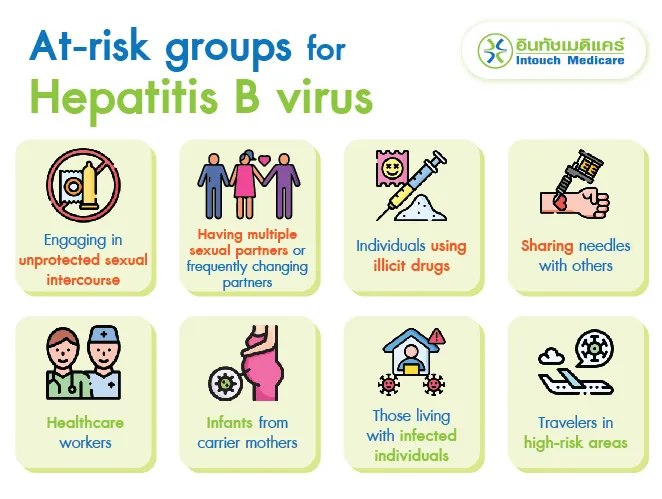
At-risk groups
Engaging in unprotected sexual intercourse
Having multiple sexual partners or frequently changing partners
Individuals using illicit drugs or sharing needles with others
Individuals who have never been vaccinated

Healthcare workers
Infants from carrier mothers
Those living with infected individuals or sharing personal items
Travelers in high-risk areas
Can Hepatitis B Virus be Cured?
Treatment effectiveness depends on the specific case, which can be categorized into three scenarios:
Case 1: The patient is healthy and their body can fight off the virus, resulting in the complete elimination of the virus from the body. This leads to the development of immunity.

Case 2: The patient does not fully recover and experiences relapses, which increases the risk of developing chronic hepatitis, liver cirrhosis, and liver cancer.

Case 3: The patient's symptoms may resolve, but the virus remains, making them a "carrier" of the disease. This means they will have the virus for life and can transmit it from mother to child. Therefore, infants born to carrier mothers should receive the hepatitis B vaccine starting at one month of age.
Read more: 3 Doses of Hepatitis B Vaccine Give You the Best Protection from Liver Cancer
How to Know if You Have Hepatitis B Virus
If you want to find out whether you have Hepatitis B virus, you can start by checking for initial symptoms, such as nausea, vomiting, jaundice (yellowing of the skin), dark urine, or pale stools. It's essential to undergo a blood test![]() to determine if the Hepatitis B virus is present in your system. There are various testing methods available, and the specific approach will depend on your medical history, symptoms, and the purpose of the tests. These evaluations will help doctors accurately diagnose and assess the status of the infection.
to determine if the Hepatitis B virus is present in your system. There are various testing methods available, and the specific approach will depend on your medical history, symptoms, and the purpose of the tests. These evaluations will help doctors accurately diagnose and assess the status of the infection.
The primary testing methods include six key tests: HBsAg , Anti-HBs , HBcAb , HBeAg , Anti-HBe , and HBV DNA . In addition to these tests, doctors may consider additional blood tests to create a treatment plan, monitor infected individuals, and assess liver damage and complications. This may include liver enzyme tests (ALT and AST), bilirubin levels, and ultrasound examinations.
Treatment Methods
The treatment for patients depends on the stage of the illness.
Treatment in the Acute Phase
Patients will receive supportive care to gradually improve their symptoms while also modifying their behavior. This is because this group has bodies that can fight the virus on their own. During treatment, patients should adhere to the following recommendations:

Eat a Balanced Diet: Consume a variety of foods from all five food groups, avoiding high-fat foods and alcoholic beverages, as they can strain the liver.
Get Adequate Rest: Ensure sufficient rest for the body to recover and effectively combat the infection.
Stay Hydrated: Drink plenty of water to prevent dehydration, as hydration also aids in flushing toxins from the body.
Avoid Liver-affecting Medications
 : Refrain from taking medications that can impact the liver. If experiencing a fever, avoid drugs that may increase liver strain, such as certain pain relievers like paracetamol. Instead, consider sponge bathing with warm or room-temperature water to reduce fever, and consult a doctor before taking any medication.
: Refrain from taking medications that can impact the liver. If experiencing a fever, avoid drugs that may increase liver strain, such as certain pain relievers like paracetamol. Instead, consider sponge bathing with warm or room-temperature water to reduce fever, and consult a doctor before taking any medication.
Treatment in the Chronic Infection Phase
In the case of chronic infection, doctors will provide treatment along with medications to control the virus within the body and to prevent potential complications that may arise for the patient.

1. Use of Antiviral Medications
Taken orally to help reduce the viral load in the body and decrease liver inflammation include:
Tenofovir: An effective medication for reducing viral load in the body and preventing complications.
Entecavir: A safe and effective antiviral drug that reduces viral levels in the body.
Interferon: An injectable medication that stimulates the immune system to fight the virus, but it has higher side effects compared to other options.
|
2.Regular Check-ups with a Doctor
Patients should undergo regular blood tests to assess viral levels and liver function as advised by their doctor.
3.Maintain Good Health
Especially focusing on liver health, patients should avoid consuming alcoholic beverages and using chemicals that are harmful to the liver.
Additional Treatment: In cases where patients have complications from the disease, such as cirrhosis or liver cancer, specialized care and treatment may be necessary, including surgery or chemotherapy.
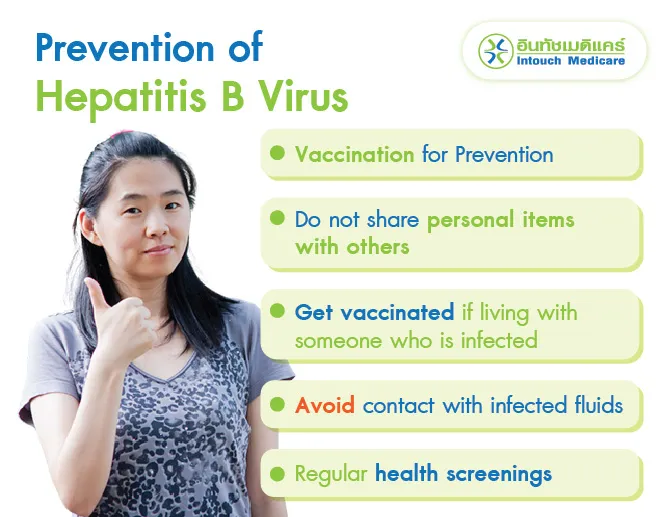
Prevention methods
To prevent infection, it is recommended to get vaccinated against Hepatitis B
 virus from infancy to effectively build immunity.
virus from infancy to effectively build immunity.Do not share personal items with others, including personal hygiene products, food, or syringes, as they may be contaminated.
If one partner is infected, the other should also receive the vaccine for protection.
Avoid contact with the bodily fluids or blood of an infected individual to prevent transmission.
Regular health screenings should be conducted.

References
Department of Medical Sciences, Ministry of Public Health, Public Health Science Research Institute
Knowledge about Hepatitis Dr. Songlaa Jitsang, Hepatitis Virus Infection
Interesting Articles
For more info and to make an appointment.
Hot Line 081-562-7722
Composer: Mr.Achawin Thamsoonthorn
Last edited : 26/09/2024
Images may be used without prior permission exclusively for educational or informational purposes, as long as proper credit is given to intouchmedicare.com


